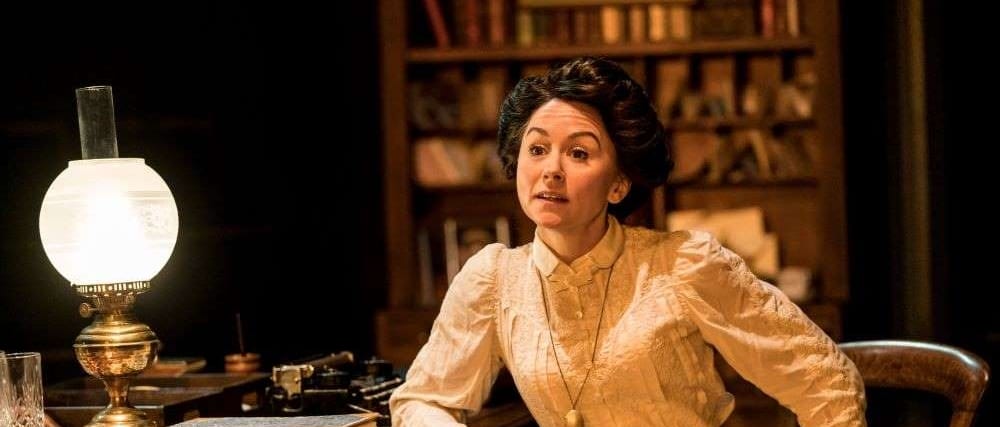Why is Bernard Shaw now so rarely performed? At the time of his death in 1950 he was considered the finest living dramatist within the British Isles, and yet of his huge output very few plays are now regular repertory fare. It seems that his persona – the quirky, dogmatic, word-spinning Socialist controversialist of the Prefaces – has eclipsed the plays themselves. Yet, as the Orange Tree Theatre has shown in the last few seasons, even his first ventures into drama have a freshness of ideas and careful stagecraft that more than earn them revival. At his best Shaw balances a battle of ideas still very much with us, framed within unexpected plotting and an ability to earth social concerns in plausible drama worthy of his great mentor, Ibsen. All of these qualities are very much on display in Candida, reset now in period style for the year in which it was written – 1894.
It is a play that deliberately dramatizes the internal conflicts of Shaw’s own personality in the shape of the two men contending for the love of the heroine, Candida, to whom one of them is already married. It also suggests, in a way that has hardly dated, that both men utterly misunderstand and indeed take little trouble to understand the qualities and concerns of the woman to whom they are expressing unlimited devotion. In its time this play was a contribution to ‘The Woman Question’, as women’s suffrage and independent, propertied working women became a feature of the social and political landscape. But it is perhaps depressing and refreshing at one and the same time that these issues and arguments continue to have such salience today.
The three protagonists are superbly cast, as they must be in such a verbally competitive play. As Rev. James Morell, Martin Hutson embodies the virile, assertive, bearded Victorian man of the cloth, so sure of himself that he not only ministers to a parish, but gives a plethora of evening lectures on improving themes. Self-confidence edges into sanctimony and self-righteousness before gradually the gas begins to leak from him in the face of the sapping attacks on his arrogant and unreflective persona. This is a beautifully gradated performance in which swagger shades into anger and from there into peevish desperation and dejection: from hero to anti-hero to lost child across the evening.
However, as in any contest it takes a good opponent to bring out the best in both players. He is well matched in Joseph Potter’s Marchbanks, an adolescent poet of aristocratic origins, whose ardent flowery rhetoric owes a bit to Wilde, but just as much to Shaw’s own aesthetic priorities. While his effusions are over the top and shallow, and intended to be seen as such, he scores real points in his accusations. His claim that an idealist such as Morrell is in fact a sophisticated hypocrite, both freeing his wife to think her own thoughts, but also requiring her to follow his lead, is more than plausible. Candida herself, has little to do in the early stages of the play other than to be the object of misdescribed male adoration, but it is ultimately her play and any successful production depends on how successfully the actress unravels the knots in the final scenes. Claire Lams plays a long and cool hand which pays off handsomely in the end. Her essential kindliness and affability is well conveyed, as well as a wry amusement at the scale and scope of male vanity and self-delusion. But there is warmth, tenderness and a degree of feline cunning too, which helps to give the lie to the view that Shaw’s women are ultimately puppets rather than players in their own right.
Around the core players circle a group of supporting roles that add colour, diversion, comedy and secondary underlining to the themes of the central dialectic. As Morrell’s sharp witted and tongued secretary, Sarah Middleton offers a delicate study of an intelligent woman full of self-knowledge but also hopelessly smitten by her employer. Kwaku Mills provides an amusing portrait of a clueless but well-meaning curate, and Michael Simkins grounds the play in an alternative class-based perspective. His portrait of Candida’s father, Mr Burgess, the working man turned into a canny and none-too-scrupulous entrepreneur plays the same role here as Alfred Doolittle does in ‘Pygmalion’. Comic foil to be sure, but also underlining Shaw’s view that morality is relative according to where you find yourself in the social pyramid.
The creative team at the Orange Tree do the usual impeccable job with choice of set, costumes and props – what appears a cluttered Victorian interior still allows free range for vigorous movement including a very plausible fight. Paul Miller directs with his customary light but assured touch.
With this play the Orange Tree completes its highly rewarding survey of Shaw’s early work. If you need a bracing antidote over Christmas to pantomime pap and seasonal silliness this production will meet your needs with interest.

